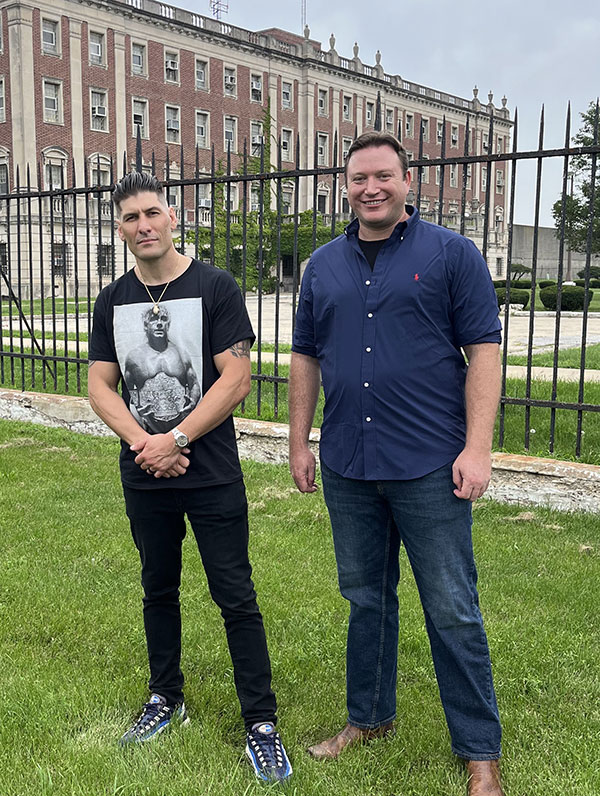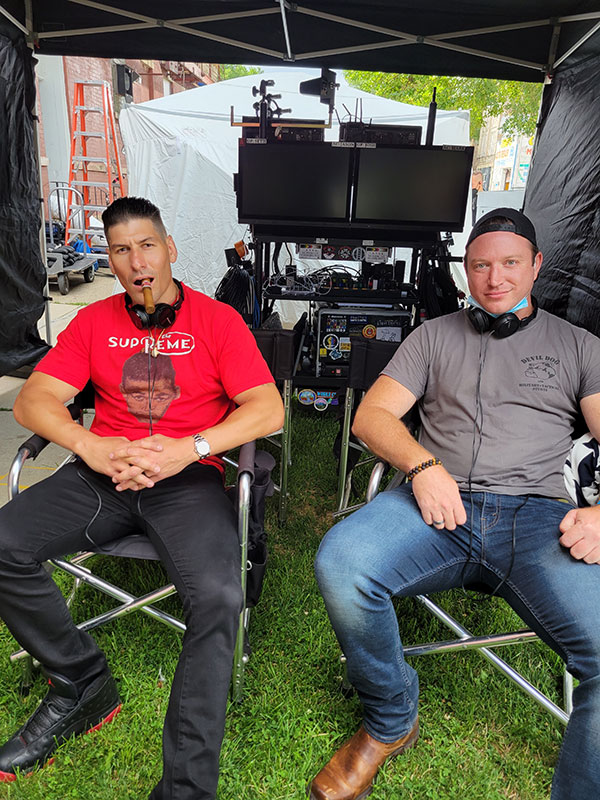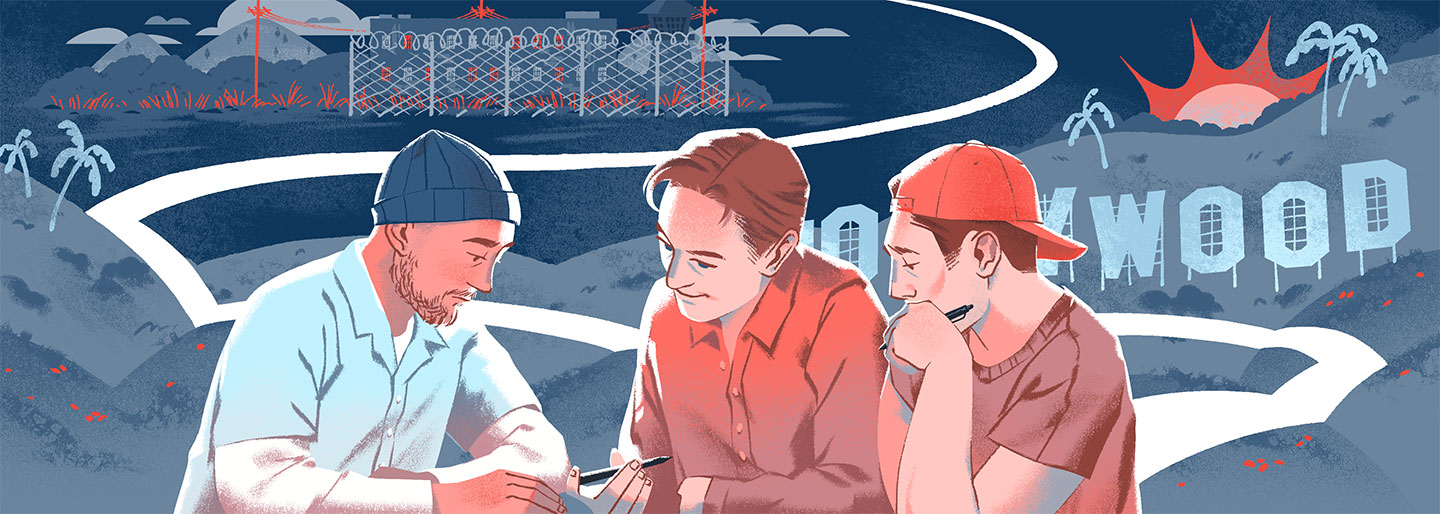Sammy Horowitz’s backstory is the stuff of movies. In fact, that’s how he met his writing partner, Adam Pasen. It’s also how the two WGAW members ended up creating the Justice-Impacted Writers Project (JIWP), teaching incarcerated men how to write screenplays.
Growing up in Chicago, “I was a gang member, drug user, drug dealer at times, armed robber, bad guy when I was a kid,” Horowitz says, speaking with Pasen via Zoom. “I was in prison for eight years, seven months and some days, into my mid 20s.” After his release, he couldn’t find work once potential employers learned he’d been convicted of a felony. He started boxing, and from there found his way to stunt work. “I was always writing, but I never had plans to write for television or film. I was writing an autobiography.”
Horowitz’s then-girlfriend, actress Sari Sanchez, thought he should write a biopic instead, but he had no idea how to go about it. She suggested he visit a friend of hers out in L.A. “She said, ‘He’s a brilliant writer. You guys are real different, but I think it could work.’”
 Writing partners Sammy Horowitz and Adam Pasen outside the Sheridan Correctional Center.
Writing partners Sammy Horowitz and Adam Pasen outside the Sheridan Correctional Center.That writer was Pasen, who befriended Sanchez when they studied acting at University of Illinois Urbana-Champaign. After taking a playwriting class, “I fell so hard for writing that I transferred to the English department,” Pasen says. He earned his master’s in creative writing at Northwestern and his PhD in playwriting at Western Michigan.
Back home in Chicago, Pasen ran into Sanchez on Michigan Avenue, “in one of those life-changing moments,” he says. “I told her I was writing some plays, and she said, ‘You had such a specific voice, have you thought of giving Los Angeles a try?’ I had, but I was writing sitcomy stuff, LGBTQI-lens stuff, and she said, ‘You should really give it a shot, I think you’ve got a good chance.’”
Her encouragement sent him to L.A, where he had a blast but couldn’t land work. After two years, he called Sanchez to tell her he was moving back. “She said, ‘Hold on, I’m seeing this guy, you’re very different, but maybe you should meet up and see if it sparks any ideas.’”
On the Zoom, Horowitz is as impassioned as Pasen is measured. And at their first coffee, just as Sanchez predicted, the two men found common ground. Horowitz and Sanchez moved to L.A, and he and Pasen worked on the biopic together, with Pasen doing the writing at first. “Over the course of a couple years, I learned everything I know structurally from Adam about writing,” Horowitz says.
And Pasen found the path that had eluded him. “With Sam, completely without exaggeration, I rediscovered my passion for writing,” he says. “I suddenly had interest in genres. I’d never worked in one-hour drama space, and I never would have tackled a crime drama on my own. Suddenly it was all exciting, and I felt really positive about the craft again.”
The biopic was optioned, “and that got us a bunch of meetings at the big agencies, and everyone wanted to be our friends for five seconds,” says Horowitz. The prolific team has written over 30 scripts, worked on Starz’ Power Book IV: Force for two seasons, and sold a movie last year.
“There’s unfortunately a cynicism around the idea of diversity and what it can bring to writing at the moment,” Pasen says. “But unironically, having met Sam, I am a completely converted, 100 percent believer in the power of aligning with people whose stories differ from yours. He really saved me and kept me in Los Angeles, and it’s because I got to work with someone who’s so different that me. There’s a lot of our story that could apply to the wider landscape as well.”
They’re setting out to prove that.

Thank God for Hollywood, because Hollywood gave someone like me a chance to change.
- Sammy Horowitz
Horowitz had heard about the Northwestern Prison Education Program (NPEP), a four-year undergraduate program at Stateville Prison. He reached out to NPEP director and Northwestern professor Jennifer Lackey with the subject line ‘Former Stateville inmate, Current WGA working screenwriter in Hollywood’ “because I wanted to make sure she answered.”
“I get a lot of requests to do things with our program, and we don’t have the capacity to do even a fraction of them,” says Lackey. But she was swayed by Horowitz’s unique perspective. NPEP arranged for him and Pasen to give a one-day feature writing workshop at Stateville.
Several students remembered Horowitz from when he was incarcerated with them. “I told those guys, ‘I broke back into this prison so I could tell you that this is possible, because you’re looking at the proof right now.’ I changed my life completely, got sober, got a career. Thank God for Hollywood, because Hollywood gave someone like me a chance to change.”
 Sammy Horowitz and Adam Pasen on the set of Power Book IV: Force.
Sammy Horowitz and Adam Pasen on the set of Power Book IV: Force.By the end of the workshop, “every single one of these 42 guys had a logline and the six plot points to start the skeleton of their own feature,” Horowitz says. “I’d say a solid 30 percent of those men were incredibly talented and, with the right nurturing of that talent, could go on to become professional writers. Every day, I see articles in the trades talking about authenticity, lived experience, and then I see some of the stuff that comes out, and I’m like, ‘Really?’ Well, here it is on a silver platter. I told Adam, ‘There’s got to be a way we can parlay this into something bigger.’”
Pasen was in. “Some of the happiest times in my life were leading workshops when I was pursuing my doctorate,” he says. “As an added bonus, the opportunity to do that with demographics I’ve never gotten to work with before, to see stories I would never have access to before, was kind of enthralling.”
They came up with the idea of a screenwriting fellowship within NPEP, for students with less than two years left of their sentences. They envisioned bringing in showrunners, executives, and managers, so that when the students were released, they would not only have scripts written, they’d have people to send them to.
Friend and fellow WGAW member Craig Sweeny (Watson) introduced Pasen and Horowitz to Kira Vandenbrand, the Director of Community Programs at the Writers Guild Foundation, and the Foundation partnered with NPEP and the Illinois Department of Corrections to make JIWP happen at Sheridan Correctional Center. (Stateville has closed since completing the first workshop.)
“Honestly, it’s a testament to how impressed we were with Sammy and Adam,” says Lackey. “The students felt like the one-off experience that they had at Stateville was incredibly impactful, and because of that, I was really open to considering something more robust.”
They’re about six weeks into the six-month program. The first class was in person; subsequent classes are on Zoom, with monthly guest lecturers. Barbie Kligman (Doc) went over the students’ loglines with them. Robert Munic (The Cleaner), due in next, will review their outlines. “I told the guys, ‘Believe you me, there’s probably some writers who’d want to be in prison right now, just to be able to talk to some of the people that you’re going to be talking with,’” Horowitz says. “And they’re laughing because they don’t know how real that is!”
“If the goal was to give the students hope and extend a branch to the future, they’re taking that very seriously, and we get to see that every time we teach a workshop,” says Pasen. “I believe in the healing and redemptive power of art, and my greatest hope is that this program will prove to have the longevity to go on in perpetuity as a source of potential help for those who could use it.” Adds Horowitz, “And hopefully if this takes off, female writers can do this in the women’s prison.”
NPEP Deputy Director Michelle Paulsen, who drives four hours roundtrip to facilitate each weekly session, calls it “truly a highlight of my week. The students have just knocked my socks off with their creativity. Seeing their progress each week, hearing how the stories are unfolding, it’s a delight.”
That goes for the instructors as well. “In the last 15 years, I’ve done a lot of amazing things that I never thought I was ever going to do,” Horowitz says. “But maybe the most rewarding thing was when we walked into Stateville the first time. The level of fulfilment and happiness that I have, being able to help somebody like this, that I wish somebody would have been able to do for me back then, is pretty awesome.”





